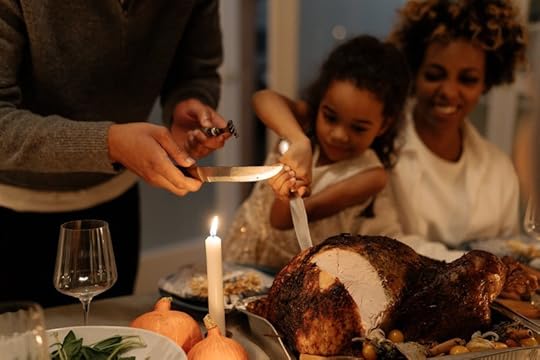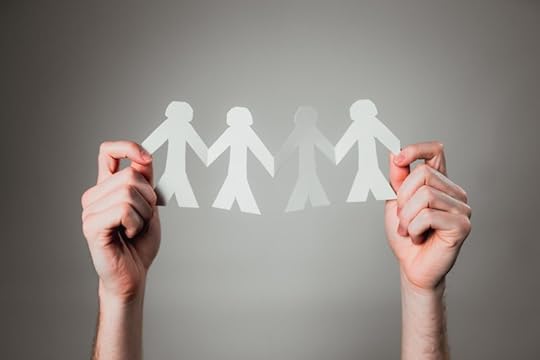Marcia Sirota's Blog, page 6
January 3, 2023
Why January is the Biggest Month for Divorce
Have you ever noticed that more couples initiate divorce proceedings in January than at any other time of the year? You must have wondered why that would be.
I think that there are a lot of reasons why people end their marriages in the New Year. January is a time for making resolutions and trying to do things differently, so it makes sense that if someone is unhappy in their relationship, they would choose that month to ask for a divorce. Still, I think that there's a bigger reason why people get separated in January as opposed to any other time of the year.
I think it's about tomorrow. When people end their relationship in January it's because they're thinking about the future.
 Photographer: Kelly Sikkema | Source: UnsplashAfter the holidays there are fewer distractions
Photographer: Kelly Sikkema | Source: UnsplashAfter the holidays there are fewer distractionsBefore I get into that, let me talk about some of the other reasons why I think people break up in the New Year. One reason is that when the holidays are over and people can no longer be distracted by the fun and festivities, they’re less able to ignore the problems in their relationship.
When January arrives and life is back to normal, it’s impossible to ignore the problems in their relationship. They’re forced to face how miserable they've been, which is why they decide to separate.
Another reason why I think that people end their relationships in January is that after an extended break, the stress and responsibilities of normal life return, exacerbating the stress of their unhappy relationship. With all the stress piling up, a person can reach their boiling point and finally decide to walk away.
As I said before, January is the time for making resolutions for the coming year and if someone has been unhappy in their marriage, they might decide in January that after dithering for a while, it's finally time to do something about it.
 Photographer: engin akyurt | Source: UnsplashEnding a marriage is extremely difficult
Photographer: engin akyurt | Source: UnsplashEnding a marriage is extremely difficult It's hard to end a marriage. You’ve spent years with this person; children are involved; you own property together; you share bank accounts, your families are inter-connected. There is so much invested in the relationship and in the life that you've created together that it’s daunting to contemplate a separation, no matter how unhappy you've been.
There are so many good things about being married, including the familiarity of knowing someone for many years; having help with the children; sharing the expenses, and having an extended family to rely on, that when you think about getting divorced, it's easy to talk yourself out of it.
But, if you finally decided that it’s just not working for you and you’ve made the difficult decision to separate, why then would you wait to do it in January as opposed to in November or December? Why wouldn’t you do it as soon as you gathered up the courage to cut the ties?
That brings us to the concept of "tomorrow." I do a lot of work around trauma and I’ve found that traumatic events become forever attached to a time or a place. Ending a marriage is obviously traumatic.
If someone is thinking about separating, they will usually wait until after the holidays because they don't want all of their future holidays and the future holidays of their children to be tainted by the trauma of a marital separation. It's bad enough to get divorced but why ruin the holidays forever afterwards?
There are a number of reasons why January is the month with the highest rate of marital separation, but I think that the main reason is that we don’t want to spoil future holidays for ourselves and our children.
______
Sign up here for my free bi-weekly wellness newsletter that brings you fresh, thought-provoking content.
Subscribe to my YouTube Channel where you’ll learn simple tips for taking the best care of yourself and your loved ones.
Tune in to my Ruthless Compassion Podcast where I go in-depth about topics like mental health, trauma, and loneliness.
if(window.strchfSettings === undefined) window.strchfSettings = {};window.strchfSettings.stats = {url: "https://marciasirotamd.storychief.io/... "Why January is the Biggest Month for Divorce",id: "84fb0907-fb13-4676-8158-d29510e9b589"};(function(d, s, id) {var js, sjs = d.getElementsByTagName(s)[0];if (d.getElementById(id)) {window.strchf.update(); return;}js = d.createElement(s); js.id = id;js.src = "https://d37oebn0w9ir6a.cloudfront.net... = true;sjs.parentNode.insertBefore(js, sjs);}(document, 'script', 'storychief-jssdk'))
The post Why January is the Biggest Month for Divorce appeared first on Marcia Sirota.
December 23, 2022
How to Support a Loved One Grieving During the Holidays—The GenZ Corner
The holidays can be a very stressful time for anybody. Visiting family, buying the perfect gift for everyone on your list, or maybe you have some traveling plans to escape the winter season? Either way, it can create some stress around this time of year.
It can also be a difficult time if you or someone close to you have recently lost a loved one.
In a time when the holidays are meant for spending moments with family and creating new memories, it can be hard for those who are grieving to be in a jolly mood. Old memories and times of reminiscing might evoke emotional distress, making the holidays dreadful for some.
Now that holiday parties are happening, it’s important for me to help my friends and partner when they need it the most. It’s inevitable that there will be some difficult comments and questions when catching up with relatives during holiday get-togethers. So, I’ve developed some strategies to help your grieving friend be less stressed at holiday outings together.
Create a signal.Before a big event, or just for general use, you can come up with a subtle signal as a way for your friend or partner to let you know that they are feeling overwhelmed at any point in time. It can be as simple as squeezing your hand or putting on a hat to indicate that they need to escape from an overwhelming conversation. You can keep an eye on them from a distance, and sweep in when you notice it.
Be their spokesperson.It’s normal for relatives or party-goers to apologize and give their sympathies. But maybe for the bereaved person, talking about it and even maybe acknowledging it can trigger distress. With permission, you can step in and speak on behalf of them, without making it seem like they are refusing to talk about it. If you’re both in agreement and you have the go-ahead, you can take the lead and say, “thank you for your condolences, it really means a lot to both of us,” followed by changing the subject to something lighthearted.
Step away.If you can, take a moment away from the noise of the holidays just to recoup. Following the signal, you can accompany your friend or partner outside or to a quiet place. If they are nowhere to be found, understand that they just needed to step out on their own and will come back when they’re ready.
Listen to what they need.I always feel like there’s so much pressure to say the perfect thing. You don’t want to say anything that will upset them, but you also want to show that you’re there to lend a hand in difficult times. Saying nothing at all can make it worse. What is most useful is to be there and just listen to what they need. You don’t have to have all the answers. You’re not there to tell them what to do or how to feel. This is something that they will have to go through on their own. It’s the best way for you to be there for them during the holidays.
Know that sometimes, they just need to be by themselves.Don’t take it personally. There is no right or wrong way for people to grieve. If they need to be alone for a little bit, understand that it’s not necessarily because they want to get away from you. Grief is a process and it can look like a lot of different things. Being alone can be one of them. Give your loved one space if they need it, and remind them that you’re still there for them, no matter what.
There’s no set time frame for someone who suffered a loss to “move on.” It’s easier for those who are not closely connected to the loss to enjoy the holidays as usual. Remember that it may take a while for your loved one to get used to the fact that they have to go through life without the person they lost. If you know someone who has lost a loved one, there’s no harm in sending them some extra love by text or phone, if you can.
______
The Gen Z Corner is a new column with the Ruthless Compassion Institue written by Elaine Genest, which features compelling first-person narratives about mental health through a Gen Z lens. You can follow her blog here
Elaine Genest is a columnist for the Ruthless Compassion Institute based in Toronto, ON. With her bachelor’s in Journalism from Concordia University, she focuses on mental health, personal reflections, and how the two intersect.
if(window.strchfSettings === undefined) window.strchfSettings = {};window.strchfSettings.stats = {url: "https://marciasirotamd.storychief.io/... "How to Support a Loved One Grieving During the Holidays—The GenZ Corner",id: "84fb0907-fb13-4676-8158-d29510e9b589"};(function(d, s, id) {var js, sjs = d.getElementsByTagName(s)[0];if (d.getElementById(id)) {window.strchf.update(); return;}js = d.createElement(s); js.id = id;js.src = "https://d37oebn0w9ir6a.cloudfront.net... = true;sjs.parentNode.insertBefore(js, sjs);}(document, 'script', 'storychief-jssdk'))
The post How to Support a Loved One Grieving During the Holidays—The GenZ Corner appeared first on Marcia Sirota.
December 19, 2022
Facing Loss During the Holidays
The season for celebrating holidays is here, filled with parties, family gatherings, and copious amounts of food and drink, but what if making merry is the last thing on our minds?
It just occurred to me that the recent suicide of Stephen “tWitch”Boss, a mere ten days before Christmas, is likely to have coloured the holiday season for his family for years to come.
Aside from the devastation they’re feeling right now, the loss will forever be associated with this time of year.
Recently, Ontarians experienced a tragic loss. Abakar Kazbekov, an up-and-coming London Knights hockey player from the Ontario Hockey League (OHL), is thought to have taken his own life on December 17th.
My heart goes out to his family, friends and teammates. I can’t imagine the pain they must be feeling. And now every year, while others are celebrating all around, those he left behind will be remembering their loss.
The expectation around the holidays is that we should be joyful and carefree. But what if this time of year has painful associations?
Tragic events become tied to an external marker – like a place, a time or an event. When tragedy strikes during the holidays we inevitably associate this time of year with painful loss.
So, how do we find our way through the holidays after having lost a loved one during the same time of year? Do we try to ignore our pain and force ourselves to be eat, drink and be merry? I think not.
For my part, I try to integrate all my feelings into the experience of the season, letting my sadness mix with the joy. I allow myself to miss the people who are no longer here while appreciating those who are.
Paradoxically, the losses I’ve suffered over the years have made me more grateful for those loved ones who remain in my life today. I don’t take anyone for granted.
For those of us who associate this time of year with loss, the season is more bittersweet than purely joyful. And that’s okay.
It’ll be a while before the families of tWitch and Abakar can feel anything but sadness, hurt and confusion, but that’s to be expected.
Over time, and with the right kind of support, their grief will undoubtedly become more bearable.
And like with any wound, when it heals there’s an opportunity to become more empathetic and more resilient; to become a better version of ourselves.
For those of us who associate the holidays with loss, it doesn’t mean that the season has to be ruined.
We can take the bitter and the sweet and create our own holiday traditions – ones that acknowledge our losses while celebrating who and what we’re grateful for.
We humans have a remarkable capacity for carrying many seemingly contradictory emotions in our hearts at the same time.
We don’t have to push away the pain and grief in order to feel the joy and contentment. We can feel all of it together.
We can acknowledge our losses, heal our wounds and hold onto one another more tightly, right now and all throughout the year.
A peaceful and loving holiday season to everyone.
If you or someone you know is in crisis and needs help, here are some resources:
Talk Suicide Canada (National) 1-833-456-4566
Distress Centres of Greater Toronto (GTA) 416-408-4357
______
Sign up here for my free bi-monthly wellness newsletter that brings you fresh, thought-provoking content.
Subscribe to my YouTube Channel where you’ll learn simple tips for taking the best care of yourself and your loved ones.
Tune in to my Ruthless Compassion Podcast where I go in-depth about topics like mental health, trauma, and loneliness.
if(window.strchfSettings === undefined) window.strchfSettings = {};window.strchfSettings.stats = {url: "https://marciasirotamd.storychief.io/... "Facing Loss During the Holidays",id: "84fb0907-fb13-4676-8158-d29510e9b589"};(function(d, s, id) {var js, sjs = d.getElementsByTagName(s)[0];if (d.getElementById(id)) {window.strchf.update(); return;}js = d.createElement(s); js.id = id;js.src = "https://d37oebn0w9ir6a.cloudfront.net... = true;sjs.parentNode.insertBefore(js, sjs);}(document, 'script', 'storychief-jssdk'))
The post Facing Loss During the Holidays appeared first on Marcia Sirota.
December 16, 2022
The Tragic Suicide of Stephen tWitch Boss Reveals Mental Health Obstacles
Like so many others, I’m heartbroken to learn about the suicide of Stephen tWitch Boss.
I remember watching him on So You Think You Can Dance in 2008 and falling in love with his talent, his charm and his grace.
As a fan, I’ve been keeping an eye out for him over the years as I’ve always enjoyed seeing him perform. His talent was immense and his personality was sparkling.
And like so many others, I had no idea that he was struggling with his mental health.
As a psychiatrist, I’ve been thinking a lot lately about the obstacles to getting timely and effective mental health care.
Obstacles to receiving good care include systemic racism and prejudice; financial constraints; the lack of available treatment providers and programs in the community; stigma; shame; social pressure to look good, and lack of support.
There are so many reasons why it’s hard for people to get the help they need. Too many people are being lost to suicide. We’ve got to bring this conversation to the forefront, right now.
tWitch was a loving husband and father. He was a caring friend and ally. He was a brilliant artist who had just turned 40. He had so much to live for. It’s unspeakably tragic.
Many people who commit suicide believe – incorrectly- that their loved ones will be better off without them. (It’s their depression talking.)
Many believe – incorrectly – that they will never get better. (It’s their depression talking.)
Many believe – incorrectly – that they’re worthless, and feel ashamed of their mental illness. (It’s their depression talking.)
Many of them simply didn’t get the treatment that would have prevented them from making this drastic and irrevocable choice. (It’s the fault of our messed-up system.)
Let’s speak out about the obstacles to receiving mental health care and let’s brainstorm about how to break down these obstacles.
It’s the least we can do to honour tWitch and to protect all the others who are suffering from untreated or inadequately treated mental illness.
If you or someone you know is in crisis and needs help, here are some resources:
Talk Suicide Canada (National) 1-833-456-4566
Distress Centres of Greater Toronto (GTA) 416-408-4357
______
Sign up here for my free bi-monthly wellness newsletter that brings you fresh, thought-provoking content.
Subscribe to my YouTube Channel where you’ll learn simple tips for taking the best care of yourself and your loved ones.
Tune in to my Ruthless Compassion Podcast where I go in-depth about topics like mental health, trauma, and loneliness.
if(window.strchfSettings === undefined) window.strchfSettings = {};window.strchfSettings.stats = {url: "https://marciasirotamd.storychief.io/... "The Tragic Suicide of Stephen tWitch Boss Reveals Mental Health Obstacles",id: "84fb0907-fb13-4676-8158-d29510e9b589"};(function(d, s, id) {var js, sjs = d.getElementsByTagName(s)[0];if (d.getElementById(id)) {window.strchf.update(); return;}js = d.createElement(s); js.id = id;js.src = "https://d37oebn0w9ir6a.cloudfront.net... = true;sjs.parentNode.insertBefore(js, sjs);}(document, 'script', 'storychief-jssdk'))
The post The Tragic Suicide of Stephen tWitch Boss Reveals Mental Health Obstacles appeared first on Marcia Sirota.
December 8, 2022
The Problem with Body Shaming Other People
I've been noticing lately that a lot of people are engaged in body shaming. So I thought it would be good to look at who we shame.
We shame people who we perceive as overweight and we also shame people who we consider underweight. In fact, there’s a lot of body shaming going on.
What is shaming? It's making the other person feel bad about themselves; feeling not good enough, not as good as the rest of us, somehow lacking in value. When we shame someone, we make them feel inferior to us, and like they are not worthy of belonging to the tribe.
 Source: Pexels.comSo let's talk about fat shaming
Source: Pexels.comSo let's talk about fat shamingFirst, people mistakenly believe that overweight people are out of control. And this being “out of control” is threatening to the person doing the shaming. They're shaming the overweight person because they're terrified that they might themselves lose control or already somehow be out of control.
To the shamer, the overweight person is a threat, because the shamer has their own urges and impulses that they're trying to repress. And maybe they're not that successful at it. But, as opposed to the overweight person, they can hide the fact of their out-of-control urges and impulses because they're not overweight. There is no visible sign that they have a problem.
Overweight people are most at risk of being shamed because they have the most obvious addiction. It seems obvious that they have an issue with food. Other people with addictions can more easily hide their problem.
The shamer attacks the overweight person so that they can feel better about themselves. They say, “see, the fat person can't control themselves, but I can,” even if it's a lie, even if they are completely out of control in some other way. They can say to the world, “see? I'm in control, but this heavy person is not.”
 Pexels.comLet’s talk about body shaming of thin people
Pexels.comLet’s talk about body shaming of thin peopleWe shame people who we consider underweight because we perceive them as “trying too hard” to achieve a perfect degree of thinness. It’s as if we’re all supposed to try really hard to be “thin enough” but we shouldn’t try so hard that we become “too thin.”
The fact that “thin enough” and “too thin” are ill-defined concepts doesn’t seem to be a problem for the shamers, any more so than the very loose definition of “overweight” that is used in the media today.
Another reason why people might shame those who they consider “underweight,” is that they are envious of the other person’s physique. Sometimes people use shaming as a way to attack someone who has something that they want. If this person is thin in a way that they could be, they might shame them when really they want to be like them.
This is why shaming exists. And it's important that the people who are being shamed can get together and stand up and say, “no, no more. I will not be shamed because of my weight. I will not be shamed because of my size. My body belongs to me and you have no right to comment on it.”
 We need to end this shaming
We need to end this shamingShaming makes people feel so bad about themselves, that at worst, it can lead to suicidal thoughts, and even to completed suicide. Shaming can be extremely toxic because it isolates you and it makes you feel separate from the tribe.
For the shamers, they need to look at what they’re afraid of. If they have their own covert addiction, it would be better for them to deal with it directly, rather than putting down somebody else. And if they’re shaming people for being “underweight,” they need to look at their issues around being judgemental or jealous and sort it out on their own.
Shaming never does anyone any good. The person being shamed is isolated and attacked. Shaming doesn’t help them “improve” anything. It just makes them feel bad. And the shamer doesn’t actually feel better for putting other people down. If they want to improve their self-worth, they need to do it directly, not by hurting other people.
______
Sign up here for my free bi-monthly wellness newsletter that brings you fresh, thought-provoking content.
Subscribe to my YouTube Channel where you’ll learn simple tips for taking the best care of yourself and your loved ones.
Tune in to my Ruthless Compassion Podcast where I go in-depth about topics like mental health, trauma, and loneliness.
if(window.strchfSettings === undefined) window.strchfSettings = {};window.strchfSettings.stats = {url: "https://marciasirotamd.storychief.io/... "The Problem with Body Shaming Other People",id: "84fb0907-fb13-4676-8158-d29510e9b589"};(function(d, s, id) {var js, sjs = d.getElementsByTagName(s)[0];if (d.getElementById(id)) {window.strchf.update(); return;}js = d.createElement(s); js.id = id;js.src = "https://d37oebn0w9ir6a.cloudfront.net... = true;sjs.parentNode.insertBefore(js, sjs);}(document, 'script', 'storychief-jssdk'))
The post The Problem with Body Shaming Other People appeared first on Marcia Sirota.
November 28, 2022
How to Avoid People-Pleasing Over the Holidays
The holidays can be a joyful time but they can also be a stressful time. There’s a lot more contact with friends and family and with that, it can be easy to slip into unconscious patterns of behaviour.
It’s not uncommon to regress into our old, childlike habits when surrounded by our family of origin, but when we do, we can find ourselves not enjoying the season so much.
One particularly counterproductive habit is people-pleasing. We learn to do it with our family of origin so it’s understandable that we’d slide back into it at family gatherings.
 Source: Pexels.comPeople-pleasing always backfires
Source: Pexels.comPeople-pleasing always backfiresI define people-pleasing as always putting the other person first and neglecting our own needs and feelings. The intent is to gain approval and acceptance. The problem with this approach is that it leads inevitably to frustration and irritation.
In my book, Be Kind, Not Nice, I differentiate two different ways to express compassion to other people.
Being nice is only considering others and abandoning ourselves in the process, while being kind is being thoughtful and loving but never at our own expense.
We can be kind over the holidays and enjoy spending time with our loved ones, without forgetting about our own feelings and needs.
 Source: Pexels.comTake responsibility for your own self-worth during the holidays
Source: Pexels.comTake responsibility for your own self-worth during the holidaysPeople-pleasing quickly breeds resentment and exhaustion because it’s not authentic. No-one is happy when they ignore themselves while doing so much for others.
And the love and approval we’re seeking by all this pleasing behaviour? We should understand that anyone who loves us does so regardless of whether or not we constantly please them.
And we should also understand that anyone who doesn’t love us won’t change their mind if we try to curry favour with them. They’ll just take advantage of our attempts to please.
 Source: Pexels.comBe yourself
Source: Pexels.comBe yourselfSo as the holiday season approaches, we can relax and remember that all we have to do is show up and be our regular selves.
We don’t have to work so hard to try and make everyone around us happy. We can enjoy our time together secure in the knowledge that the only way to be loved is by being our authentic, imperfect selves.
Happy holidays everyone!
______
Sign up here for my free bi-monthly wellness newsletter that brings you fresh, thought-provoking content.
Subscribe to my YouTube Channel where you’ll learn simple tips for taking the best care of yourself and your loved ones.
Tune in to my Ruthless Compassion Podcast where I go in-depth about topics like mental health, trauma, and loneliness.
if(window.strchfSettings === undefined) window.strchfSettings = {};window.strchfSettings.stats = {url: "https://marciasirotamd.storychief.io/... "How to Avoid People-Pleasing Over the Holidays",id: "84fb0907-fb13-4676-8158-d29510e9b589"};(function(d, s, id) {var js, sjs = d.getElementsByTagName(s)[0];if (d.getElementById(id)) {window.strchf.update(); return;}js = d.createElement(s); js.id = id;js.src = "https://d37oebn0w9ir6a.cloudfront.net... = true;sjs.parentNode.insertBefore(js, sjs);}(document, 'script', 'storychief-jssdk'))
The post How to Avoid People-Pleasing Over the Holidays appeared first on Marcia Sirota.
November 22, 2022
David Bowie Teaches Us How To Be Grateful This Thanksgiving
Another Canadian Thanksgiving has come and gone and another American Thanksgiving approaches. As I sit down to write about being thankful, I realize that this might be pretty challenging to a lot of people.
These are difficult times. Our political system both north and south of the border is increasingly polarized. We’re still not through the pandemic, and in fact, the hospitals in Ontario are full-to-overflowing with Covid cases, both adult and pediatric. Inflation is making everybody more stressed as prices at the grocery store and gas pump keep rising, and our climate is already demonstrating the chaos that was predicted when experts spoke of global warming.
So how are we supposed to be thankful, right now? I think that we need to go beyond the facts of our situation and consider other ways to bring gratitude to our lives. Today, as I was going for my early morning walk, I was listening to the song, Changes, by David Bowie, that he recorded in 1971. It’s an oldie but a goodie. There’s a line in the song that goes, “Turn and face the strange.” That got me thinking.
 Photographer: Shoeib Abolhassani | Source: UnsplashTurn and Face the Strange
Photographer: Shoeib Abolhassani | Source: UnsplashTurn and Face the StrangeWhat does it mean to “turn and face the strange?” To me, it means embracing situations that make us uncomfortable as opposed to turning away from them. It means trying to understand people whose way of thinking and acting might be “strange” to us. It means being counter-phobic.
People with a counter-phobic attitude actively seek out the things that make them anxious or uncomfortable, as opposed to running away from these things. The counter-phobic person is the opposite of the avoidant person.
So how will embracing the strange and the uncomfortable result in us becoming more grateful at the end of 2022? Well, if we consider that so much of our unhappiness comes from feeling alone, isolated and alienated from one-another, it stands to reason that feeling more connected to people will make us happier. Embracing the strange is likely to build more and better connections, making us happier, and that will be something to be grateful for.
 Photographer: Gift Habeshaw | Source: UnsplashStress Causes Unhappiness
Photographer: Gift Habeshaw | Source: UnsplashStress Causes UnhappinessAlso, a lot of our unhappiness is caused by stress, and a lot of our stress is caused by feeling anxious and uncomfortable in new situations or around new people. If we could just “turn and face the strange,” so much of our anxiety and stress would dissipate and that too would be cause for celebration.
Maybe we can’t be grateful – yet – for the end of Covid, and we certainly can’t give thanks for a robust economic situation right now. We can’t feel appreciative of our political situation and climate change is nothing to give thanks over.
 Photographer: Hello I'm Nik | Source: UnsplashPhotographer: Hello I'm Nik | Source: UnsplashBeing Counter-phobic
Photographer: Hello I'm Nik | Source: UnsplashPhotographer: Hello I'm Nik | Source: UnsplashBeing Counter-phobicAnd yet, if we are able to be counter-phobic and embrace the people and situations that make us uncomfortable, we might just feel a whole lot better about everything.
This doesn’t mean that we suddenly become best friends with people whose lifestyles or political persuasions are utterly different from our own (although maybe it does), but it means that we have a more open mind and open heart.
It means that instead of running from the uncomfortable in fear, we explore it; we engage with it; we bring our curiosity and creativity into these situations. Turning and facing the strange means trusting ourselves to be able to tolerate surprises, even the potentially unpleasant kind.
Resilience is an incredibly important personality trait. It enables us to thrive when we face challenges. Those who are resilient can make lemonade out of the proverbial lemons. Those who lack resilience become overwhelmed and incapacitated by difficulties, both large and small.
When we trust ourselves to enter challenging, uncomfortable, or strange situations with people who aren’t like us, we grow as human beings. Every time we face such a challenge, we become stronger, more competent, and more capable. We become more resilient. The counter-phobic individual goes from challenge to challenge, becoming a better and better (and happier) version of themselves.
On the other hand, the avoidant person never gets the opportunity to face challenges head-on. They never get to develop confidence (or resilience) and they have few opportunities to develop competence. They remain anxious, ill at ease, and unhappy. When you choose not to “turn and face the strange,” you lose.
In my own life, I’ve surprised myself by befriending people who hold very different political views than I do. I’m a huge animal lover and I’ve made friends with people who don’t consider themselves “pet-people.” I’ve realized that I have a much higher tolerance for being around people who are “strange” to me, as long as these people aren’t being hurtful to me or others in the world.
 Photographer: Andrew Moca | Source: UnsplashMaking Strange
Photographer: Andrew Moca | Source: UnsplashMaking StrangeThere’s a phenomenon in infants at 8 or 9 months of age called, “making strange,” when they become fearful of any new person or situation. Fortunately, they grow out of this stage relatively quickly. For us adults, we need to remember that just because something is strange, that doesn’t mean it’s dangerous. We are much more sophisticated than an infant and we can make more informed decisions about what to approach and what to avoid.
In this season of Thanksgiving, with so much polarization and alienation around us, I suggest that we all try to “turn and face the strange.” If we can be more open to people and situations that are new and different, compared to what we’re used to, we might be happier and less stressed and therefore have more cause for gratitude, right now and in the months to come.
______
Sign up here for my free bi-monthly wellness newsletter that brings you fresh, thought-provoking content.
Subscribe to my YouTube Channel where you’ll learn simple tips for taking the best care of yourself and your loved ones.
Tune in to my Ruthless Compassion Podcast where I go in-depth about topics like mental health, trauma, and loneliness.
if(window.strchfSettings === undefined) window.strchfSettings = {};window.strchfSettings.stats = {url: "https://marciasirotamd.storychief.io/... "David Bowie Teaches Us How To Be Grateful This Thanksgiving",id: "84fb0907-fb13-4676-8158-d29510e9b589"};(function(d, s, id) {var js, sjs = d.getElementsByTagName(s)[0];if (d.getElementById(id)) {window.strchf.update(); return;}js = d.createElement(s); js.id = id;js.src = "https://d37oebn0w9ir6a.cloudfront.net... = true;sjs.parentNode.insertBefore(js, sjs);}(document, 'script', 'storychief-jssdk'))
The post David Bowie Teaches Us How To Be Grateful This Thanksgiving appeared first on Marcia Sirota.
November 7, 2022
10 Simple Ways to Decrease Inflation Stress
Stress is always hard to deal with, and financial stress is one of the worst types of stress we can experience. The economy is not doing very well these days. Inflation is going through the roof. Canada could be on the verge of a recession. That’s because it goes right to our survival fears. We wonder if we can keep our family and ourselves out of trouble.
When we are under significant financial stress, it can affect our mood, our sleep, and our relationships. We can become more irritable, more impatient, and less tolerant of others. We can turn to addictions to soothe and distract ourselves from our money worries.
It doesn’t look like the economy is going to get much better any time soon, so, I’d like to offer 10 tips for dealing with stress during these difficult financial times. Most of them don’t cost anything, and those that do – like arts and crafts – can be supplied by the dollar store.
 Photographer: Towfiqu barbhuiya | Source: Unsplash10 Simple Ways to Decrease Inflation Stress:
Photographer: Towfiqu barbhuiya | Source: Unsplash10 Simple Ways to Decrease Inflation Stress:1. Be kind to yourself if you’re feeling stressed out these days. Instead of criticizing yourself for snapping at your children, for example, or for eating too much junk food, recognize that these are signs of stress and that you need to start dealing with it head-on.
2. Think about all the things that are stressing you out these days and see if you can let go of some of them. With all the financial stress you’re experiencing, you don’t need to be burdened as well by toxic frenemies, abusive relatives or overly-expensive hobbies. What stressors can you cut out of your life, right now?
3. Surround yourself with positive, supportive people. They might not be able to help you financially, but knowing that they have your back will decrease your general level of stress.
4. Carve out time to decompress. Meditate, go for walks in nature, do some deep breathing, and practice your faith. All of these things will lower your stress levels considerably.
5. Express yourself through creativity. Whether through drawing, painting, writing, crafting or any other form of creative expression, you’ll feel less stressed just by doing these activities.
6. Talk to people about how you feel. You might be fine just talking to friends or family members but it’s also okay to speak to a professional if discussing things with your loved ones isn’t doing the trick.
7. Move your body. Whether you’re exercising, playing sports, practicing yoga or going dancing, the physical release you get through movement will also help you to release your stress.
8. Sometimes you just need to have a good cry. There’s nothing embarrassing about letting out your frustration or your fears through the release of tears. It’s scary and upsetting to have money trouble and sometimes having a good cry can make you feel like a weight has been lifted.
9. Practice constructive self-soothing. You might be tempted to overeat, drink too much, or indulge in other compulsive behaviours these days, but know that these don’t really help. What will help is compassionate self-talk, silencing the inner critic, and doing things like lighting candles and taking a bubble bath or exchanging a gentle massage with your partner.
10. When you’re feeling helpless and overwhelmed it can seem like there are no solutions to your problems. But, when you do all the above steps, it can put you in the right frame of mind to brainstorm creative solutions to your current financial difficulties and possibly reduce your stress just a little bit more.
______
Sign up here for my free biweekly wellness newsletter that brings you fresh, thought-provoking content.
Subscribe to my YouTube Channel where you’ll learn simple tips for taking the best care of yourself and your loved ones.
Tune in to my Ruthless Compassion Podcast where I go in-depth about topics like mental health, trauma, and loneliness.
if(window.strchfSettings === undefined) window.strchfSettings = {};window.strchfSettings.stats = {url: "https://marciasirotamd.storychief.io/... "10 Simple Ways to Decrease Inflation Stress",id: "84fb0907-fb13-4676-8158-d29510e9b589"};(function(d, s, id) {var js, sjs = d.getElementsByTagName(s)[0];if (d.getElementById(id)) {window.strchf.update(); return;}js = d.createElement(s); js.id = id;js.src = "https://d37oebn0w9ir6a.cloudfront.net... = true;sjs.parentNode.insertBefore(js, sjs);}(document, 'script', 'storychief-jssdk'))
The post 10 Simple Ways to Decrease Inflation Stress appeared first on Marcia Sirota.
October 27, 2022
Our Halloween Masks Might Reveal Secrets About Ourselves
Halloween is almost here. It’s got me thinking about the masks that we wear on this holiday as well as those we wear all year long. We choose to wear a disguise on Halloween but often, without realizing it, our choice of masks reveals more about us than we might realize. It could be making a statement about who we are or who we want to be.
If we wear a mask that represents a political figure, we’re often telling others that we wish we were like them or that we had their power. Sometimes, it’s to spoof the politician by wearing a caricature mask of their face. We’re behaving in a goofy manner to make them look bad.
If we’re wearing the mask of a comic book or video game character, we might be revealing who we wish we could be. We’re saying that we want to be more heroic or have special abilities.
If we’re dressed provocatively, we might be expressing our sexuality in an indirect way. We can always blame the costume for being overly sexy, as opposed to outright owning it.
Whether we realize it or not, the unconscious part of our psyche is always trying to express itself. It will sometimes manifest in the choice of mask we wear on Halloween.
 Photographer: Martino Pietropoli | Source: UnsplashThere’s a part of the psyche called the “shadow.” It contains all of the darker or wilder wishes, urges and impulses that we’re extremely uncomfortable expressing directly.
Photographer: Martino Pietropoli | Source: UnsplashThere’s a part of the psyche called the “shadow.” It contains all of the darker or wilder wishes, urges and impulses that we’re extremely uncomfortable expressing directly.Most of the shadow content is unconscious because on a conscious level, we’d be embarrassed to face these desires and urges. Our mind does its best to keep this content under wraps. Sometimes, though, the shadow has a way of showing itself; for example, when we’re intoxicated. Alcohol or cannabis can lower our inhibitions and allow the shadow to leak out.
Actors are lucky because they get to explore the shadow parts of their psyche. Whenever they play someone nasty or evil, they get to express the ugly, dirty parts of their own psyche without having to take responsibility for them. It can be extremely cathartic to be able to pretend in this way.
For us non-actors, Halloween is a great time to let our shadow out because we get to experiment with a different persona and no-one can tell if the mask we’ve chosen to wear on this night is hiding our true nature or revealing it.
Masks can be objects of great power. They’ve been used in ceremonies and rituals all over the world since the beginning of time. It’s clear that across cultures, there’s an understanding that what we’re showing on the surface is not the whole of who we are. Masks give us an opportunity to reveal the darker or more embarrassing parts of ourselves in a safe way.
Some masks we wear unconsciously. These are used for self-protection, to deflect judgment or to avoid rejection. If we’re at a party, for example, and we’re feeling vulnerable we might adopt a mask of coolness or aloofness in order to feel less uncomfortable. Or, we could be starting at a new school and adopt a mask of bravura to hide how nervous we’re feeling in this new environment.
These types of masks can be helpful, but at some point we’ll want to let down the mask in order to show the people around us who we really are. Otherwise, we’ll never be able to connect.
It’s up to each of us in our day-to-day interactions to look beyond the masks to see into the real person behind them. Sometimes this is easier said than done; especially when the other person really doesn’t want to be seen. Some people are too insecure to reveal who they really are. Some people are bad guys and don’t want the rest of us to figure out who they really are.
 Source: Pexels.comIntimacy is defined as “seeing and being seen.” If our masks are always up, we can’t ever be close to others or enjoy genuine relationships.
Source: Pexels.comIntimacy is defined as “seeing and being seen.” If our masks are always up, we can’t ever be close to others or enjoy genuine relationships.It’s exhausting constantly having to keep up our masks and it can even be off-putting. There has to be a balance between how much we cover up and how much we reveal. Masks may misrepresent who we are or show us in a negative light. An unwillingness to drop the mask might be interpreted as having secrets to hide.
This Halloween, we can think about the mask we want to wear. Is there a part of our psyche that we’ve been embarrassed to express? This can be the ideal time to let it out in the form of a mask. We can decide how much we want to reveal and how much we want to keep private. We can reveal a little sliver of our shadow self and it can all be in good fun. Happy Halloween, everyone.
______
Sign up here for my free biweekly wellness newsletter that brings you fresh, thought-provoking content.
Subscribe to my YouTube Channel where you’ll learn simple tips for taking the best care of yourself and your loved ones.
Tune in to my Ruthless Compassion Podcast where I go in-depth about topics like mental health, trauma, and loneliness.
if(window.strchfSettings === undefined) window.strchfSettings = {};window.strchfSettings.stats = {url: "https://marciasirotamd.storychief.io/... "Our Halloween Masks Might Reveal Secrets About Ourselves",id: "84fb0907-fb13-4676-8158-d29510e9b589"};(function(d, s, id) {var js, sjs = d.getElementsByTagName(s)[0];if (d.getElementById(id)) {window.strchf.update(); return;}js = d.createElement(s); js.id = id;js.src = "https://d37oebn0w9ir6a.cloudfront.net... = true;sjs.parentNode.insertBefore(js, sjs);}(document, 'script', 'storychief-jssdk'))
The post Our Halloween Masks Might Reveal Secrets About Ourselves appeared first on Marcia Sirota.
August 24, 2022
Why Am I Always Jealous? How to Deal with Jealousy — The Gen Z Corner
Jealousy is one of my least favourite feelings, alongside grief and defeat.
I wish I was nonchalant about everything and everyone. I wish that I wouldn’t let jealousy take me over as much as it does. For a long time, I tried to be the cool girlfriend who was fine with my ex-partner hanging around other girls, or the best friend who doesn’t mind that my bestie has more friends, or the chill sister who is okay about getting left out during family reunions. If I didn’t care that much it wouldn’t matter. But I do care. A lot.
When people come into my life, I invest so much time and energy into the relationship that when they inevitably meet someone else, I feel completely betrayed. I end up resenting the person who took my companion away from me.
In that moment of pure jealousy, it feels like a fire forming at the base of my abdomen. It heats up until it gets so out of control that it shoots right out of my eyes, aiming at the person who made me feel that way. After all, they started it, right?
The older I got, the more it felt like I had to compete for people's attention. Jealousy had made a place in every aspect of my life. But this way of living made me feel worse, not better, and I became completely exhausted. I kept wondering, what’s missing in me that they’re finding in someone else?
There’s no real way around jealousy. Ignoring it is like trying to push a beach ball underwater; no matter how hard you try to push it down, it’ll find its way to the surface again.
Although you can expect jealousy to arise on occasion, (which can surely help alleviate any guilt that comes along with it) it’s still a sensation that is so physically present and emotionally potent that it’s nearly impossible to prepare yourself for.
So why not listen to it? Jealousy can say a lot about who we are, what we’re needing, missing, and ultimately, what we need to let go of. This is especially true for toxic relationships; those that are built out of distrust, dishonesty, and disloyalty and which should not have a place in your life.
Being jealous can be a normal response to certain uncontrollable situations. Coach Shannen Bryant talks about how jealousy consumed her life and she coined the term “Jealousy Junkie.” After many years of working to overcome jealousy in her own relationships, she is now one of the few people who specialize in jealousy (a topic that is often ignored but experienced by many). She says jealousy is usually a warning sign, similar to knowing not to touch a hot burner on the stove. You don’t want it to fully go away, but you don’t want it to control your life.
Jealousy arises when you’re afraid of loss. You’re worried that someone or something will be taken away from you. It’s letting you know to hold on tight and do whatever it takes to avoid being broken-hearted. But this belief that you can be in control of all your relationships will ultimately lead you to exhaustion.
When I finally started listening to my jealousy, I was able to start fulfilling my own needs instead of relying solely on others to meet mine. My incessant need to please others and exceed their expectation as a way to control their actions was killing me. It’s not about giving into the jealousy, but rather, understanding that when these warning signs show up, it’s time to take care of yourself, as opposed to trying to control the people around you.
The next time you feel a little flicker of heat forming in the pit of your stomach, ask yourself what’s making you feel this way. Is there something that you’ve been ignoring? You’ll never know what you can discover about yourself until you listen.
______
The Gen Z Corner is a new column with the Ruthless Compassion Institue written by Elaine Genest, which features compelling first-person narratives about mental health through a Gen Z lens. You can follow her blog here
Elaine Genest is a columnist for the Ruthless Compassion Institute based in Toronto, ON. With her bachelor’s in Journalism from Concordia University, she focuses on mental health, personal reflections, and how the two intersect.
if(window.strchfSettings === undefined) window.strchfSettings = {};window.strchfSettings.stats = {url: "https://marciasirotamd.storychief.io/... "Why Am I Always Jealous? How to Deal with Jealousy — The Gen Z Corner",id: "84fb0907-fb13-4676-8158-d29510e9b589"};(function(d, s, id) {var js, sjs = d.getElementsByTagName(s)[0];if (d.getElementById(id)) {window.strchf.update(); return;}js = d.createElement(s); js.id = id;js.src = "https://d37oebn0w9ir6a.cloudfront.net... = true;sjs.parentNode.insertBefore(js, sjs);}(document, 'script', 'storychief-jssdk'))
The post Why Am I Always Jealous? How to Deal with Jealousy — The Gen Z Corner appeared first on Marcia Sirota.
Marcia Sirota's Blog
- Marcia Sirota's profile
- 1 follower



